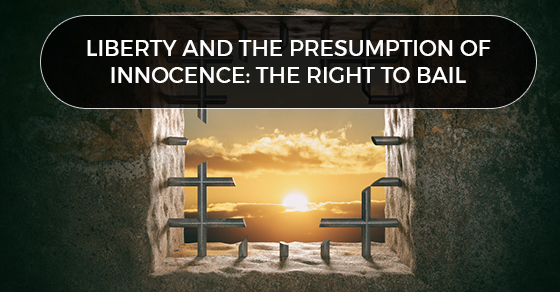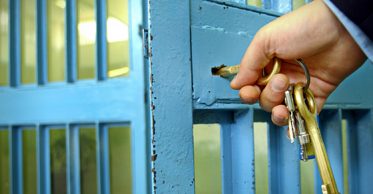LIBERTY AND THE PRESUMPTION OF INNOCENCE: THE RIGHT TO BAIL

Blog by Cassy Beaulac and Arun S. Maini
Last month, a Kitchener judge denied bail to Udo Haan, the man charged with first-degree murder in the fiery house explosion that killed his wife, Edra Haan in their Kitchener home.
On August 22, 2018, emergency crews responded to an early morning house fire. Emergency crews quickly discovered Haan and the body of his wife in their backyard. Haan was so seriously injured that he was transported by air to a trauma hospital in Hamilton.
The explosion destroyed the Haan’s house in its entirety, and irretrievably damaged two neighbouring houses.
A publication ban is in effect, which prevents the public from knowing the judge’s reasons for denying Haan’s bail.
Despite the publication ban, the constitutional underpinnings of judicial interim release, more commonly referred to as “bail” are well-known.
Section 11(e) of the Canadian Charter of Rights and Freedoms (“Charter”) provides that:
“Any person charged with an offence has the right not to be denied reasonable bail without just cause”.
Section 11(e) encompasses two important rights. First, it enshrines the right to “reasonable bail,” and secondly, the right to not be denied bail without “just cause.”
“Just Cause”
“Just cause” means that generally an accused person can only be denied bail if the Crown can prove on a balance of probabilities that one or more “grounds for detention” are met. However, a “reverse onus” occurs for certain offences, such as the offence of terrorism or murder. This means that in these limited circumstances, the accused’s will have to show why he or she should be released before trial. In other words, it is harder to get bail in those cases.
The three grounds for detention are:
- Primary Ground. A defendant can be detained on the “primary ground” when a detention order is necessary to ensure the accused’s attendance in court. Factors can include whether the accused lives in the jurisdiction or elsewhere; the type of offence for which the accused is charged (someone is more likely to skip bail and disappear when facing a murder charge than a shoplifting charge); and the criminal history of the accused (i.e. does he have a history of failing to attend court).
- Secondary Ground. A person can be detained on the “secondary ground” where there is a “substantial likelihood” of him interfering with the administration of justice or committing another offence while on bail.
- Tertiary Ground. Detention on the “tertiary ground” occurs where it is necessary to maintain confidence in the administration of justice. Denial of bail on tertiary grounds is usually reserved for serious offences, having regard to a number of factors, such as:
- The apparent strength of the Crown’s case
- The seriousness of the offence
- The circumstances surrounding the offence, including whether a firearm was used
- If a guilty verdict, whether the accused’s can face a lengthy sentence, and where a firearm is involved, where a minimum sentence of three years exists.
“Reasonable Bail”
There is a legal presumption that a defendant will be released on the most lenient condition: an undertaking (promise to attend court) with no conditions.If the Crown seeks conditions or a stricter form of bail such as a “recognizance” with sureties, the Crown must prove or justify why it is not acceptable for the accused to be released without conditions. This is called the “ladder principle.” The Crown must “show cause” or prove why the least onerous (or less serious) form of release is not acceptable. The ladder principle recognizes the fundamental right to liberty and to the presumption of innocence. Individuals accused of crimes are presumed to be innocent. An undertaking with no conditions is the default position. The Crown must show cause for each “step of the ladder” they wish the defendant to climb. Each “step of the ladder” must be considered and rejected by the court before climbing to the next step.
An accused person who is denied bail can choose to seek a review of the decision. This is called a “bail review.” A bail review is not a “second kick at the can.” Whether a bail review succeeds will depend on the accused’s particular case and circumstances. Where an accused person seeks a review of the decision, he or she will be tasked with proving that since the bail hearing one of the following has occurred:
- Circumstances of the case have materially changed. Would the judge or justice of the peace arrive at a different decision if he or she was hearing the case today?
- The judge or justice of the peace made an error in law when denying the accused bail.
If the judge determines that the accused has proved that a material change exists or an error in law was made, the judge will reconsider the issue of bail. This does not necessarily mean that original decision of the denial of bail will be reversed. In other words, the judge will now hear the case as if the hearing was occurring for the first time in the original bail court. The judge may confirm the prior order, or release the accused on conditions.
In the case of Udo Haan, the judge’s decision means that unless circumstances change, he will mean that he will remain behind bars until his hearing, which has yet to be determined.
Cassandra Beaulac is a recent graduate of the University of Windsor Law School
Arun S. Maini is a criminal lawyer and former prosecutor with over 20 years of experience.


